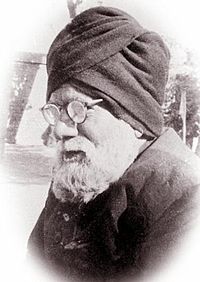- Ghulam Bhik Nairang
-
Ghulam Bhik Nairang 
Full name Ghulam Bhik Nairang Born September 26, 1876 Died October 16, 1952 Era Modern era Region South Asia School Sunni Main interests law, politics, poetry, Islam InfluencedSyed Ghulam Bhik Nairang (September 26, 1876 - October 16, 1952)
(Urdu: سید غلام بھیك نیرنگ ), also known as Meer Nairang, was a distinguished lawyer, a poet and a prominent Indian Muslim leader. He held office with the All-India Muslim League, India, pre-partition (1947). He was close friends with Allama Muhammad Iqbal, a college-mate and fellow poet. His compilation of poetry - Kalaam-e-Nairang was published in 1980s from Karachi.In 2006, the Karachi-based Dawn newspaper published an article where his literary services were eulogised.
Contents
Early life
Born 7th Ramadan, 1293 H. (September 26, 1876) at Doorana (Distt. Ambala, India), Meer Nairang was given the name Ghulam Mohi-ud-Din. However, it was later changed to Ghulam Bhik – to show respect to the saint/ sufi Meeran Bheekh of nearby Thaska. Meer Nairang’s forefather, Syed Abdul Kareem Rizvi had migrated to Doorana from Tirmiz, Iran in 800 H. The family had vast land at their disposal, which however decreased to one gaon (village) by the time Meer Nairang’s father, Syed Qasim Ali’s time. He was a pious, religious farmer. His death in 1888 left Meer Nairang an orphan, but his pious, courageous mother instilled in him good moral values and an urge to work hard. He worked hard for school education at Ambala and topped the Entrance examination of the Punjab University, Lahore in 1895.
He got enrolled at the Government College, Lahore and lived in its hostel. There he had the company of bright, distinguished personalities and became friends with Allama Iqbal, Chaudhry Jalal Din, and others. This was instrumental in his getting more interested in literature. Meer Nairang got a Distinction in his B.A. examination. He also completed his law graduation in 1899. He then moved to Ambala and started his law practice, getting established as one of the top brilliant lawyers.
In 1901 he was elected Ambala’s Municipal Commissioner. He left his practice in 1909 to become the Public Prosecuting Inspector. He resigned in 1920 after Tehreek-e-Mawalaat.
Legal and Professional Career
Meer Nairang took part in educational and public welfare activities. He was an Executive member of Muslim Educational Conference, Anjuman-e-Islamia Ambala, Nadwatul Ulema Lukhnow, Member of Court, Member of Executive Council, Aligarh Muslim University; and got established Muslim High School Ambala. He was also elected as Member of Court, Delhi University in 1946.
Political career
Meer Nairang took part in the Khilafat Movement and Tehreek-e-Mawalaat. He was a dedicated Muslim Muballigh and preacher of Islam. He established (with the help of prominent personalities) the Jamiat Markaziya Tabligh-ul-Islam in July 1923, and remained its General Secretary for long.
Allama Iqbal persuaded him to come into the political arena. Meer Nairang got elected unopposed Member Legislative Assembly from District Ambala in 1934. His association with the Muslim League from then on was complete; he remained its MLA throughout then on. In 1938 he became its Deputy Leader in the Assembly, Quaid-e-Azam Mohammad Ali Jinnah being the Leader. He kept this position till 1942, relieving himself to give way to younger persons.
After Pakistan came into being in 1947, Meer Nairang was nominated the first National (and Legislative) Assembly’s member. He settled in Jhang initially, but later moved to Lahore to look after the family of his recently widowed daughter (wife of Dr. Syed Zafar-ul- Hasan) in 1949. He breathed his last at Lahore on 16 October 1952.
Literary Contributions
Meer Nairang was a frequent contributor to prestigious literary Urdu magazines (esp. “Makhzan”, “Zamana”, “Humayun”, “Aligarh Old Boys”, and his own “Tableegh”). His articles on political, national and literary topics also appeared in the prominent newspapers (“Inqilaab” Lahore, “Zamindaar” Lahore, “Paisa Akhbar” Lahore, “Wakeel” Amritsar, “Sach” Lukhnow, “Khilafat” Bombay etc.).
Meer Nairang’s collection of verse “Kalaam-e-Nairang” was first printed in 1907, then (revised) in 1917 the second edition came out; both had an Introduction by Sir Abdul Qadir. In 1983 its third edition (compiled by Dr. Meen-ud-Din Aqeel) was published from Karachi (by Maktaba-e-Asloob, P.O. Box 2119, Karachi-18). Another book, “Ghubaar-e-Ufq” was twice published by Jamiat Markaziya Tableeghul Islam. Various other booklets, presidential addresses, book introductions, speeches etc. were his creations.
The Ghulam Bhik Nairang Foundation
The Ghulam Bhik Nairang Foundation is a social work organisation that celebrates the achievements of Meer Nairang and other prominent leaders of Pakistan. It seeks to highlight opportunities for youth to participate in the development of Pakistan, and in this spirit, also highlights worthy causes.
Links
Categories:- 1875 births
- 1952 deaths
- Indian poets
Wikimedia Foundation. 2010.

